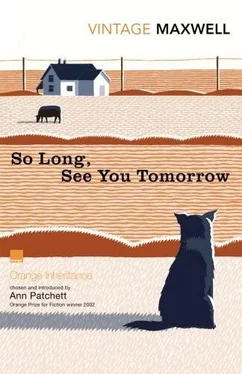What Lloyd Wilson didn't say (because there was nothing anybody could do about it anyway and why should he burden Clarence with his trouble, if you could call it that) was that he didn't seem capable any more of the kind of feelings he used to have. He was perfectly aware of his wife's good qualities. She worked like a slave, from morning till night, holding up her end of things. She was a good mother. There was no question about any of this. Sometimes he thought it was just that they were so used to each other. He knew how she felt about almost everything, and, most of the time, what she was going to say before she said it. If they had been brother and sister it wouldn't have been very different — except that she was jealous. If he so much as looked at another woman she acted as if he'd done something unforgivable. Once or twice she worked herself up to such a pitch that she went upstairs and started packing. He knew that such persuasion as he could muster was halfhearted and wouldn't convince her to change her mind. If she was bent on leaving him there was nothing he could do about it. She didn't leave him, she only threatened to. None of those women meant anything to him, he said. And with her face averted she said, "The trouble is, I don't mean anything to you either."
Whether he himself would have come to this conclusion if she hadn't embarrassed him by putting it into words, he couldn't say. All he knew was that he wished she hadn't said it. He was ready to provide for her and to treat her with respect, but he couldn't work up a semblance of the emotion that would have made her happy.
Between these crises they lived like any other married couple. You could not have told from her voice as she said, "I'm about to put things on the table, Lloyd," or his voice as he said, "Pass the salt and pepper, please," that there was anything wrong.
He wondered if other men felt the same way about their wives or if it was just him. He was almost forty years old and lately it had seemed to him that he had lived a long time and that just about everything that could happen to him had happened.
When his evening chores were done he walked over the hill and, leaning against a post in the cow barn, directed a steady stream of conversation at the back of Clarence's head. When Clarence and Victor carried the milk to the shed off the kitchen where the separator was, he followed them. And from there into the house. Anything to keep from going home. Sometimes he told himself he ought not to go to the Smiths' so often. He was afraid of becoming a nuisance, and still not quite able to stay away. One night, sitting in their kitchen, he tried to tell them how much their friendship meant to him, and then broke off in embarrassment, because anything he might say seemed so much less than he felt.
"You don't have to tell us," Fern said, smiling at him. "And anyway, it isn't as one-sided as you appear to think." Then she changed the subject.
He sat back, glad that he had spoken and glad she had stopped him from going on. He also recognized that what she said wasn't just politeness. They were themselves in front of him, as if he had assured them (he hadn't, but it was nevertheless true) that he didn't expect them to be anything they weren't. All this was altered irrevocably by a change in him so unexpected that it was as if it had happened without his knowing a thing about it. And after that he could not go on being natural in front of them.
He said silently (but nevertheless wanting to be heard) Clarence, you ought not to trust me.. half expecting Clarence to answer Why not? If Clarence had, then he would have said Because all my life I’ve been a stranger to myself.
He hated himself for being weak, for having no will, but it wasn't that he didn't try to overcome the feelings he knew he shouldn't have. Time after time he thought he had overcome them, and it always turned out that he hadn't. Excuses to pay a visit to the barns (where she wouldn't be, so there was no harm in it) or to the house (where she would be) occurred to him constantly. He would reject four in a row and find himself hurriedly acting on the fifth. His feet took him there, without his consent. He might as well have given in in the first place.
Searching for a clue to her feelings, he was alert to the quality of her voice when she spoke to her children or Clarence. He knew when she was depressed. He knew also that like most married people she and Clarence quarreled sometimes. Did he imagine it or was it true that they got on better with each other and were more cheerful when he was around?
If he did what he knew he ought to do, which was not go there any more, Clarence would wonder why. So would she. The idea that she would think of him at all pleased him. All day long he thought about her. The cows sensed that he hardly knew what he was doing and turned their heads as far as their stanchions would permit and looked at him gravely.
He sighed, and then a moment later sighed again — deep sighs that seemed to come from as far down as they could come. To have escaped from that deadness, from the feeling that all he had to look forward to was more of the same. .
But he was careful. He didn't make a simple remark without rehearsing it beforehand. And he continually removed the expression from his face lest it be the wrong one, and give him away. He also avoided any strong light, such as the lamp on the kitchen table. Sometimes a weakness overcame him, his legs were unstrung, and he had to find some place to sit down, but this was easy enough to disguise. It was his voice that gave him the most trouble. It sounded false to him and not like his voice at all.
His wife yawned and then yawned again a minute later, and put the cover on her workbasket and gathered up her mending. "I declare, it's snowing," she said. She got up and went into the bedroom, and he sat looking at the snow, which was coming down in big cottony flakes.
"Aren't you coming, Lloyd?"
He turned the wick down until the lamp sputtered and went out. Then he went into the next room and, sitting on the edge of the bed, began to undress. As long as she doesn't know how 1 feel about her…
He kissed her eyelids.
"Now, why would you want to do a thing like that?" Clarence asked.
"Well, land is cheap, for one thing. I could own my own farm and raise what I pleased on it, and not have to share the profits."
"Or the losses, in a bad year. You've been on the Stroud place all your life. It's home to you. You know everybody for miles around and they know you. If you get into trouble, you can expect help."
"True enough," Lloyd Wilson said soberly. He knew that if Clarence did not say "help from me" it was because he didn't want to remind him how beholden he was.
"Who knows what it is like in Iowa. You may find that people are friendly out there and then again they may not be."
What Fern felt, he could not make out. Nothing, maybe. Maybe she resented his friendship with Clarence and would be glad if he moved away.
She was standing at the stove, with an apron on, rinsing the supper dishes in a pan of hot water. She had moved the lamp to a shelf higher than her head and the light fell on the nape of her neck, the place that in women and small children always seemed to express their vulnerability. Looking at the soft blond hairs that had escaped from the comb, he thought of all those people who, because of their religion, had knelt down in great perturbation of mind and had their heads chopped off. His heart was flooded with love for her and he lost the thread of what Clarence was saying.
Riding into town with him, Clarence said, "Fern's as cross as a bear this morning."
"Yes," he said, trying to seem no more interested than if Clarence had said he had to replace some part in the manure spreader.
Читать дальше












